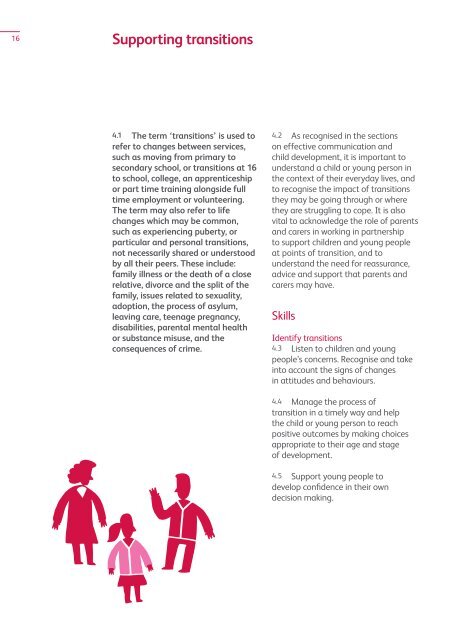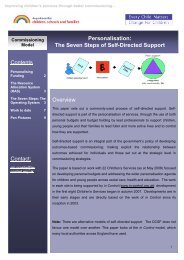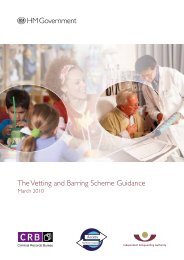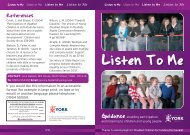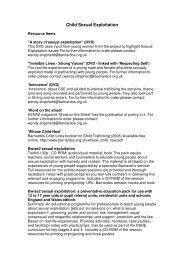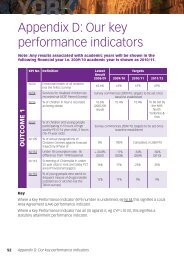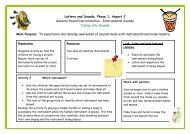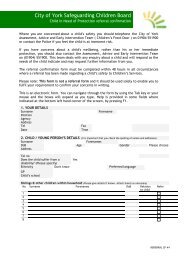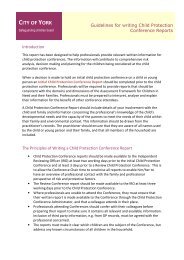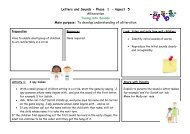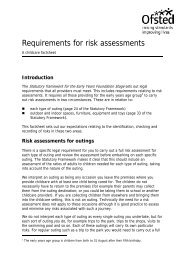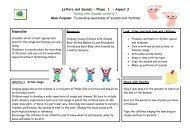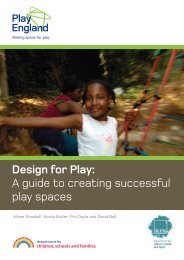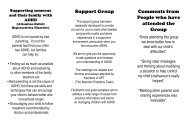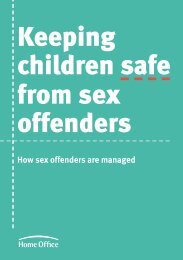The common core of skills and knowledge - Knowledge Hub
The common core of skills and knowledge - Knowledge Hub
The common core of skills and knowledge - Knowledge Hub
Create successful ePaper yourself
Turn your PDF publications into a flip-book with our unique Google optimized e-Paper software.
16<br />
Supporting transitions<br />
4.1 <strong>The</strong> term ‘transitions’ is used to<br />
refer to changes between services,<br />
such as moving from primary to<br />
secondary school, or transitions at 16<br />
to school, college, an apprenticeship<br />
or part time training alongside full<br />
time employment or volunteering.<br />
<strong>The</strong> term may also refer to life<br />
changes which may be <strong>common</strong>,<br />
such as experiencing puberty, or<br />
particular <strong>and</strong> personal transitions,<br />
not necessarily shared or understood<br />
by all their peers. <strong>The</strong>se include:<br />
family illness or the death <strong>of</strong> a close<br />
relative, divorce <strong>and</strong> the split <strong>of</strong> the<br />
family, issues related to sexuality,<br />
adoption, the process <strong>of</strong> asylum,<br />
leaving care, teenage pregnancy,<br />
disabilities, parental mental health<br />
or substance misuse, <strong>and</strong> the<br />
consequences <strong>of</strong> crime.<br />
4.2 As recognised in the sections<br />
on effective communication <strong>and</strong><br />
child development, it is important to<br />
underst<strong>and</strong> a child or young person in<br />
the context <strong>of</strong> their everyday lives, <strong>and</strong><br />
to recognise the impact <strong>of</strong> transitions<br />
they may be going through or where<br />
they are struggling to cope. It is also<br />
vital to ac<strong>knowledge</strong> the role <strong>of</strong> parents<br />
<strong>and</strong> carers in working in partnership<br />
to support children <strong>and</strong> young people<br />
at points <strong>of</strong> transition, <strong>and</strong> to<br />
underst<strong>and</strong> the need for reassurance,<br />
advice <strong>and</strong> support that parents <strong>and</strong><br />
carers may have.<br />
Skills<br />
Identify transitions<br />
4.3 Listen to children <strong>and</strong> young<br />
people’s concerns. Recognise <strong>and</strong> take<br />
into account the signs <strong>of</strong> changes<br />
in attitudes <strong>and</strong> behaviours.<br />
4.4 Manage the process <strong>of</strong><br />
transition in a timely way <strong>and</strong> help<br />
the child or young person to reach<br />
positive outcomes by making choices<br />
appropriate to their age <strong>and</strong> stage<br />
<strong>of</strong> development.<br />
4.5 Support young people to<br />
develop confidence in their own<br />
decision making.


